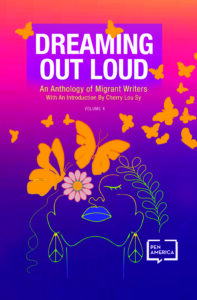An Interview with 2022 DREAMing Out Loud Contributors, Aria Gallo and Luz Aguirre
DREAMing Out Loud is a paid, tuition-free creative writing workshop series for young immigrant writers, primarily those who are undocumented, DACA recipients, and/or DREAMers who came to the United States when they were children. This year, we sat down with Aria Gallo and Luz Aguirre from the 2022 cohort. We discussed writing as an outlet, the importance of storytelling, and the difference DREAMing Out Loud has made in their lives. Along with the rest of their cohort, their writing can be found in the DREAMing Out Loud Anthology Vol. 4 made available on Amazon.
1. When did you first realize that you had an interest in writing?
Aria Gallo: As early as I can remember. I kept a journal from a very young age. My dad regularly came home from work with a new book for me to read, so I was always inspired. I loved my collection of Nancy Drew and Hardy Boys books. Sometimes I wrote my own short stories and shared them with my parents. I’m sure they weren’t all great – but my mom and dad patiently encouraged me to write more. They taught me that words are powerful.
Luz Aguirre: I managed a writing workshop at Mano a Mano: Mexican Culture Without Borders in collaboration with the NY Writers Coalition. At first, I would catch up on work at the end of the day waiting for the workshop to finish to lock the office. However, the facilitator would not allow me to stay in the space without participating, so I started writing. It took me a while to take it seriously. I became amazed at the stuff that falls out of our heads and sticks to the paper.
2. What was your inspiration behind your anthology submission?
AG: My parents. It was always going to be about them. There is a lot of criticism and stigma surrounding undocumented immigrant parents and the choices they make for their children. And in my entry, I admit that even I didn’t always understand the wisdom and gravity of their sacrifice. Now I am their staunchest defender and advocate, as I take stock of my life and come to fully realize all that they have given me. My parents are more than data points and they are not scapegoats. If people could see what I see, day in and day out, what it means for my mom and dad to live with their decision, they would approach the topic with clear-eyed empathy. In short, my anthology submission is a love letter.
LA: I submitted a personal essay and two poems. The personal essay “An Undocumented American’s Examined Life” is about my experience as an undocumented migrant because that was the mandate of the DREAMing Out Loud workshop. I wrote the poem “For the Boy I Liked for Almost Two Months” about the first guy I dated after twelve years of being single. It happened during the pandemic and he became a muse of sorts, inspiring me to write after a long hiatus. The last poem, “Of Stardust,” was inspired by the poem “Where I’m From” by George Ella Lyon–a DOL workshop prompt. I am in my forties, and when I was growing up, nobody wanted to hear our stories–they were “too provincial” (racism, prejudice, intolerance, etc.). Because of that, it has always been hard for me to share my “origin story.” I guess this is my attempt at exposure therapy, forcing myself to be comfortable with the part I hid in an effort to assimilate. Kudos to young people who do not have to go through that crap!
“If people could see what I see, day in and day out, what it means for my mom and dad to live with their decision, they would approach the topic with clear-eyed empathy. In short, my anthology submission is a love letter.”
3. What has sharing your story or experience done for you?
AG: For a long time, being undocumented was my deepest, darkest secret. My family carried unspoken shame with us everywhere we went, and for years I walked around with deep-seated fear that the people around us would find out. The media and the terminology I often heard only exacerbated that feeling. We were referred to as “aliens” or “illegals,” as if that status defined our entire personhood and existence. This experience was the culmination of a decades-long learning journey to understand that our immigration status was nothing to be ashamed of. And we were never less than because we were missing a piece of paper. As I share our story I hope that my mom and dad come to realize this too, as well as anyone who may be in a similar situation.
LA: Sharing my experience is a struggle. When I analyze my life through my experience as an undocumented migrant, I feel weighed down by this system. After three decades of being undocumented in this country, I still do not know how to deal with it. Writing about it for the program felt as if I was an unraveling piece of embroidery. The undocumented experience gave way to parental abandonment, a violent upbringing, clinical depression, and many other issues that those of us forced to migrate deal with–there are reasons we leave our places of origin.
4. What is the most memorable moment from your DREAMing Out Loud workshop?
AG: There are many memorable moments. During the program, every Friday I had the experience of reading drafts of my writing to a group of people I had never met before. I also had the honor of listening to their beautiful, vulnerable, and diverse immigrant stories. We laughed, we cried, we truly heard each other. I will always cherish the time we spent.
Another memorable moment was simply telling a room full of strangers how incredible my mom and dad are, receiving the warmest response, and looking at their faces. My parents tend to keep their heads down but they deserve recognition – and I am grateful for the chance to give them a fraction of that.
LA: Meeting the DREAMing Out Loud creator, Alvaro Enrigue, in the green room during our reading as part of PEN America’s World Voices Festival was a highlight. I studied art history and architecture and his book, Sudden Death, is one of my favorites. I geeked out and was trying to look composed as we waited to get on stage. He very graciously gave us pointers on how to conceal our nerves onstage. We did not have a podium to hide behind, we felt exposed and he graciously went looking for one.
“When I analyze my life through my experience as an undocumented migrant, I feel weighed down by this system. After three decades of being undocumented in this country, I still do not know how to deal with it. Writing about it for the program felt as if I was an unraveling piece of embroidery.”
5. What would you say to someone struggling to share their story?
AG: There is no need to rush; you will find the right words and the right platform at the right time. Find peace in the process and the truth.
LA: I have been in a creative writing rut for the past eight years (six years in school and two pandemic years). With the exception of “For the Boy I Liked for Almost Two Months,” I have not had the time or opportunity to write the type of work I want. Being in the program got me out of that rut, most of the work for the workshop flowed easily onto the page.
6. What would you say to someone struggling to share their story?
LA: I am not going to lie; it is scary to be this exposed. I believe that if it makes one person out there feel less alone or if it changes one person’s perspective on the immigration debate, then it is worth it. I often question all the rhetoric around undocumented immigrants. This is not an issue that can be rationally debated on a soap box. It is a deeply emotional issue that many of us are not equipped to address. More often than not, we engage in shouting matches where everyone’s moral compass breaks down dehumanizing each side. Art has always been at the forefront of progressive humanitarian issues because it is easier for a person to engage with a work of art. As the adage goes, “the pen is mightier than the sword,” pick up the pen!

Aria Gallo was born and raised in Manila, Philippines, and immigrated to the United States in 2002. She presently holds a (conditional) green card after being a DACA recipient for several years and undocumented prior. She works as a Program Associate at the Liz Claiborne & Art Ortenberg Foundation, where she helps administer the Foundation’s grantmaking portfolio of conservation projects in significant wildlife landscapes around the world. Aria now serves on the board of UnLocal, Inc., a community-centered nonprofit organization that provides direct immigration legal representation and community education to New York City’s undocumented immigrant communities. She holds a master’s degree in Biology from Miami University’s Advanced Inquiry Program and an executive certificate in Nonprofit Fund Development from the University of Notre Dame. She graduated with a bachelor’s degree from The City University of New York’s Baruch College. Aria currently lives in Long Beach, New York, with her husband Joe.
 Luz Aguirre is an Ame-Mexi-Pocha immigrant living in the US since 1990. She is a head-in-the-clouds renaissance woman interested in the multidisciplinary arts, philosophy, and the sciences. She was published in “Voices: The Journal of New York Folklore” (Fall/Winter, 2010), A-Way (Medusa Editorial, 2013), Esperanzas Desesperadas (NY Writers Coalition Press, 2013), and “SOMOS: Latinx Literary Magazine” (Brown University Press, Fall, 2019). She holds an AA in philosophy and a BA in art history and architecture.
Luz Aguirre is an Ame-Mexi-Pocha immigrant living in the US since 1990. She is a head-in-the-clouds renaissance woman interested in the multidisciplinary arts, philosophy, and the sciences. She was published in “Voices: The Journal of New York Folklore” (Fall/Winter, 2010), A-Way (Medusa Editorial, 2013), Esperanzas Desesperadas (NY Writers Coalition Press, 2013), and “SOMOS: Latinx Literary Magazine” (Brown University Press, Fall, 2019). She holds an AA in philosophy and a BA in art history and architecture.






